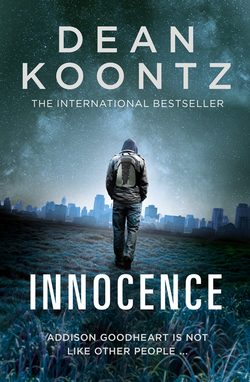Читать книгу Innocence - Dean Koontz, Dean Koontz - Страница 21
Fifteen
ОглавлениеTHE OFFICE FELT SUMPTUOUS EVEN IN NEAR darkness. It reminded me of certain photographs by Edward Steichen: velvet shadows deepening into moody gloom, here and there a form suggested by a reflection of light on a radius of polished wood, the mysterious gleam of Tiffany glass in the pendant shade of a lamp not lit, the room implied rather than revealed, yet known as well as if it had been enraptured by sunshine instead of barely kissed by the ghost light of the haunted city beyond the windows.
The fragrance of the curator’s spice cologne lingered in his absence.
Painted by the glow of the computer screen, Gwyneth’s face acquired an Asian aspect, largely because her pale skin and dramatic black makeup reminded me of the mask of a Kabuki actor.
She didn’t seem to be a rich girl. Of course, I had never before known a rich girl, and had no experience by which to determine if she might be a familiar type among the wealthy. I thought not.
“Your father has millions?”
“Had. My father is dead.”
“Is that who you meant, the only one who could ever help you?”
“Yes.” She scrolled through the directory on the screen. “My father understood me. And protected me. But I couldn’t protect him.”
“How did he die?”
“In so many words, the autopsy said, ‘Accidental death by honey.’”
“Honey like bees?”
“My grandfather, Daddy’s father, had apiaries, hundreds of hives. Rented them out to farmers, then processed and bottled the honey.”
“Is that where the family fortune came from?”
A brief soft laugh escaped her. Though she was amused by my ignorance, the sound was as appealing as any music I had ever heard. I thought that I might like nothing better than sitting with her as she read a comic novel, just sitting and watching her laugh.
“My father married late in life, and I never met my grandfather. But in my family, beekeeping was a passion, not a money machine.”
I said, “Well, I don’t know a lot about money. I don’t need much of it.”
From an inner pocket of her leather jacket, she produced a memory stick, inserted it into the computer, and began to download documents.
“My father’s the one who hit it big in real estate, but he grew up in the bee business, and he loved artisanal honey. He had a farm outside the city, and he kept a lot of hives. He also traded honeys with beekeepers in other parts of the country, because they taste different depending on the plants from which the bees harvest the nectar. Daddy loved every kind of honey—orange blossom from Florida and Texas, avocado honey from California, blueberry honey from Michigan, buckwheat and tupelo and fireweed honey … He bottled lots of flavors and blends for himself and friends. It was his hobby.”
“How can honey accidentally kill someone?”
“My father was murdered.”
“You said—”
“The autopsy report said accidental. I say murder. He ate some creamed honey, spread it thick on scones. It was contaminated with cardiac glycosides, oldedrin, and nerioside, because the bees had harvested the nectar from oleander bushes, which are as poisonous as anything on Earth. Considering the dose he received, a few minutes after finishing the scones, he would have broken into a sweat, vomited violently, passed out, and died of respiratory paralysis.”
As she found another document that she wanted to add to the memory stick, I said, “But it does sound accidental, doesn’t it? To me, it does, anyway.”
“My father was an experienced beekeeper and honeymaker. So were the people he exchanged honey with. It can’t have happened. Not with all their experience. The deadly honey was the only contaminated jar in his pantry, the only one containing poison. That was wholesome honey once, and later someone added oleander nectar.”
“Who would do that?”
“A piece of human debris named J. Ryan Telford.”
“How do you know?”
“He told me.”
In its silken gloom, the murderer’s office retained its air of elegance, of privilege waiting to be enjoyed, of authority waiting to be exercised. But now the sensuous lines of the lacquered furniture, revealed largely by reflections of pale light along the sleek curves of exotic woods, suggested a room as sinister as it was elegant.
More than eighteen years since I’d seen it in the store window, the tuxedoed marionette rose again in memory. The most strange and disquieting conviction overcame me: that if I were to switch on the lights just then, I would discover the loose-jointed puppet sitting on the sofa, watching me as I watched Gwyneth at the murderer’s computer.
